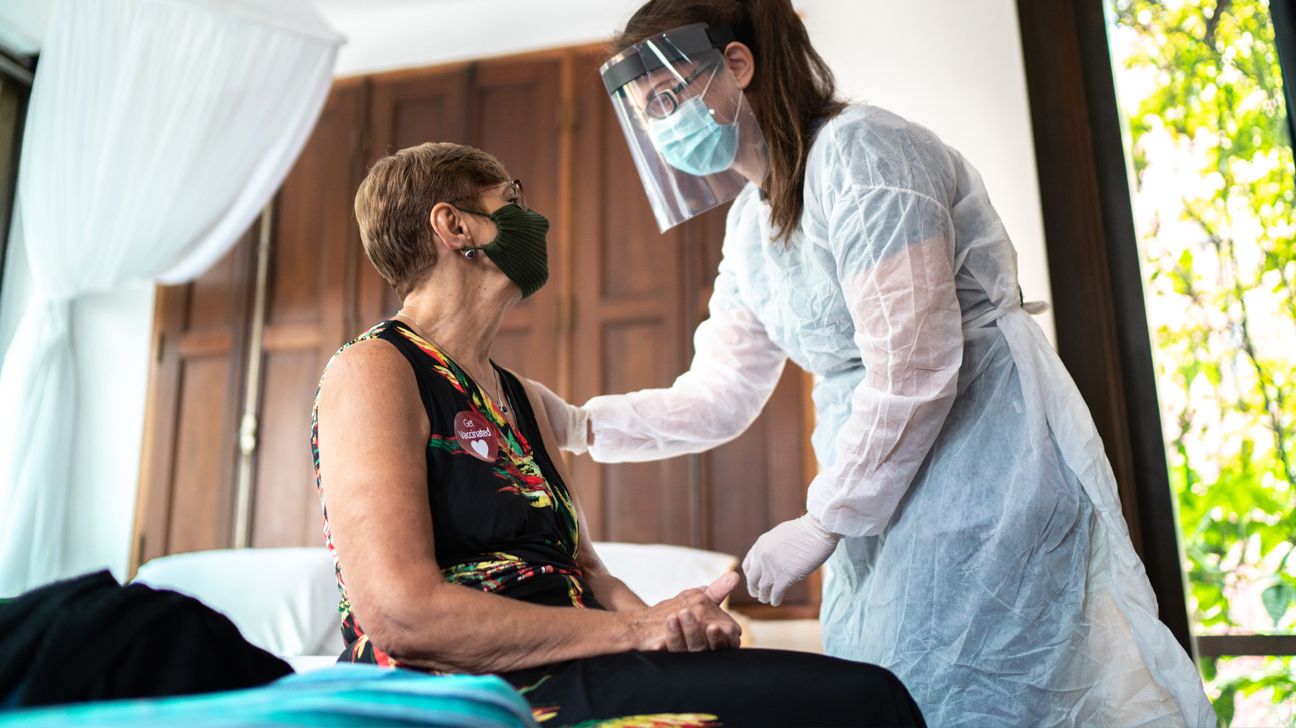My Experience with the COVID-19 Vaccine and Chronic Migraine
May 03, 2021
Content created for the Bezzy community and sponsored by our partners. Learn More

FG Trade/Getty Images
My fears about the vaccine triggering a migraine attack didn’t come true, and I can’t wait to hug my parents again soon.
I have been looking forward to the opportunity to get the COVID-19 vaccine for over a year.
Or, maybe it’s not that I’ve been looking forward to the vaccine so much as the freedom from fear and worry that it represents.
My reasons are my parents, ages 90 and 88, and my 17-year-old nephew with type 1 diabetes. Reducing their exposure has been a family goal.
We used to get together as a family every Thursday, order pizza from my brother’s pizza shop, and catch up. That all stopped a year ago — which was hard, since we’ve been having pizza night every week since 1996.
We switched over to Zoom pizza night for a while and socially distant and outside in the summer, but we have missed seeing each other in person.
I miss hugging my parents.
While I was excited about the possibility of getting vaccinated once it was my turn, as someone living with chronic migraine, I had some concerns.
The COVID-19 vaccine is a frequently discussed topic in chronic migraine online support groups, with good reason.
Many people living with chronic migraine have daily symptoms and are worried that the COVID-19 vaccine will increase them — a rather daunting thought.
And those rumors…
I heard a lot of rumors about the vaccines, even before they were available to the public. Most didn’t have much to do with science.
I adopted a wait-and-see attitude and basically ignored anything not from a credible medical source.


My choice to get vaccinated
I tested positive for COVID-19 in February 2021.
Since then, I have been having more migraine attacks than are typical for me.
The challenging part is that they tend not to respond well to my medications, and they linger for a few days.
These persistent headaches have been reported by many people who have had COVID-19.
According to the American Migraine Foundation, these types of headaches are common after infectious illnesses and can be attributed to bacterial, viral, or other systemic infections. (The vaccine can’t cause this COVID-19 complication.)
Six weeks after recovering from COVID-19, I became eligible for the vaccine. I was somewhat concerned about getting vaccinated so soon after, so I had my doctors weigh in.
They each had an opposite opinion. Ultimately, I went with the recommendation of the doctor who had dealt with more COVID-19 cases: Get the vaccine.
The side effects
My experience with the vaccine was mostly in line with my expectations.
After my first injection, my whole arm was sore, and I noticed a stuffy nose within about 3 hours after administration.
By that evening, I had muscle aches, felt tired, had a low-grade fever, and my joints felt stiff and a little painful. This lasted until the following night when it resolved like someone had flipped a switch — there one second, gone the next.
With my second injection, the soreness in my arm was much more localized to the injection site.
I felt pretty good for about 6 hours, with just some neck and shoulder tightness that I thought could easily be from a potential migraine attack starting. It wasn’t.
At the 6-hour mark, I started a fever of 101 degrees that would stay with me for about 28 hours. My muscles, joints, and even skin hurt. I was tired and just couldn’t get motivated to do anything.
When I woke up the following day, about 48 hours from the injection time, I felt like I had slept well. Aside from a very small spot on my arm that was still sore, I was good to go.
I fully expected to have a migraine attack after one or both of these shots. I had to drive almost an hour to my vaccination site, plus there was weather (always a trigger for me) and extra stress from work and life.
Amazingly enough, I didn’t have an attack.
For each vaccine injection, I had reactions for a little over a day.
With COVID-19, I had the same symptoms that lasted for about 10 days and lingered for another 6 weeks.
Looking forward
I am hopeful that with most of my siblings and their families vaccinated, we will be able to see each other again and enjoy a regular pizza night at my parents’ house soon.
I feel grateful to have the opportunity to make the choice to get vaccinated and respect the choices of others.
I am excited about going to a restaurant or a baseball game and feeling like it’s just a normal occurrence again.
I don’t know what getting back to “normal” will look like or how long it will take; none of us do. But this feels like a step in the right direction.
I don’t feel invincible, but I do feel cautiously hopeful optimism — and I haven’t felt that way since the pandemic began.
Article originally appeared on May 3, 2021 on Bezzy’s sister site, Healthline. Last medically reviewed on May 3, 2021.
Medically reviewed on May 03, 2021
2 Sources


Like the story? React, bookmark, or share below:
Have thoughts or suggestions about this article? Email us at article-feedback@bezzy.com.
About the author